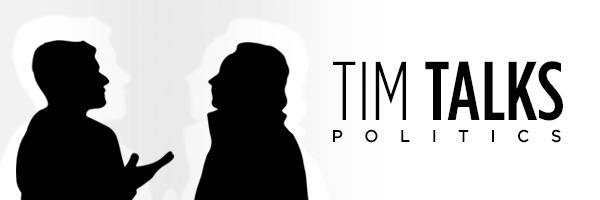Tim Talks Politics, The Weekly Brief - February 23, 2018

The Weekly Brief - February 23, 2018
10 Years After the Great Recession
2017 was an incredibly productive year for the American economy made the more significant as we close the first decade after the Great Recession. The Center for American Progress shares some data on some of the improvements states have made since 2009 on unemployment and bankruptcies, and it does look a lot better.
However, the swelling of the stock market, the emergence of protectionist trade policies, and the volatility of American politics could cause trouble down the road. Brookings also reports on the increasingly high amount of debt being taken on by college students creates economic constraints in early career years. We still don’t know what the long-term effects will be.
Schools, Guns and Data
I've waited a week to say anything about the school shooting in Florida mostly because it’s a general rule of mine not to say anything until a week has passed after tragic events such as this. Part of it is so I can take time to reflect on what's happening and just listen to the response. I've been both intrigued and saddened by the conversations that have occurred.
The shooting in Florida quickly gave rise to a demonizing of Republican lawmakers for their apparent intransigence in the face of tragedy. The Atlantic shares some insight from Republican Congressman Joe Barton, a survivor of the attack on members of Congress last year. I share it because it cuts against the dominant narrative being told about mass shootings and who's to blame.
Another interesting element in this recent tragedy is the rapid engagement in activism by students who were victims of the shooting. This is unique and as Politico points out it could be a game-changer in the gun control debate.
That being said, the students and their allies will have to contend with the powerful NRA lobby which Politico points out always seems to win. But does the NRA win with money? Maybe not. The NRA as cultural touchstone raises a crucial question for advocates of gun control: Do they have a cultural alternative that could conceivably replace the gun culture advocated by the NRA?
As is typical with the highly partisan debate surrounding tragic events, misinformation spread quickly with the numbers of recent school shootings and mass shootings getting conflated and inflated. Daily Signal does a quick fact check on some of the data. Fact-checking is not enough, though, as Politico points out that there is a significant need for more stringent scientific research methods on the issue of gun violence. Brookings runs two very good pieces backing this up by advocating for better data collection for policymaking, and indicating that parents and parties are not so far apart on policy when it comes to making schools safer.
Finally, The Federalist makes a provocative statement by suggesting thirteen ways schools can incubate mental instability that could lead to violence. Provocative though the argument may be, if we’re to take the mental health side of violence seriously, it does require that we evaluate the role of institutions like public schools…. With good data of course.
ICEing Immigration
Adding some fascinating data to the debate on immigration policy, Pew Research has put together some data that actually is quite surprising given the dominant narrative about federal crackdowns on undocumented immigrants. The narrative generally says that the crackdown is indiscriminately targeting undocumented immigrants which is threatening to families. However, Pew reveals that since 2009 the great majority of ICE arrests of undocumented immigrants has been to arrest people with previous criminal records.
I see your Ministry of Truth and raise you “Deep Fakes”
The Supreme Court is increasingly becoming enmeshed in dealing with laws surrounding technology and privacy, which is most timely and important. However, I wonder if the Supreme Court is going to be playing catch-up or if they're ahead of the game on this one.
Brookings asks if TV can bear some responsibility for the cultural and values divisions between urban and rural America? Assuming this is true, Harvard Business Review asks a very pertinent question as to whether we can keep biases out of our algorithms? After all it's human operators with human biases that program AI.
So, if you have this big divide between urban and rural America and programmers are building this divide into the assumptions running AI, how is it going to impact our society?

If you want to go deeper down this rabbit hole of technology, privacy, and information, making their debut in this newsletter the Lawfare blog takes a look at the disturbing trend of “deep fakes.” Yes, get used to that phrase because we have officially entered Ministry of Truth waters.
“Deep fakes” refers to emerging technology primarily used in the pornography industry, but increasingly accessible to anyone with the tech and know-how. Deep fakes marry voice and image of one person to that of another.
In other words, politically speaking, October surprises before election night can now be entirely fabricated and have an electoral effect before they're even proven fake.
If you think Russian interference in the 2016 election was sophisticated well, you ain’t seen nothing yet.
From Russia with Likes
So first I felt bad that I really wasn't following the Trump-Russia collusion investigation thing, but FiveThirtyEight tells me that the investigation is actually moving really, really fast. I'm glad that I’m not the only one who feels that way.
That being said, big news on this front over the last week was the Mueller indictment of thirteen Russian individuals that detailed the Russian interference in the American election. Of course, everybody quickly ran to their partisan corners to claim the indictment backed up pre-existing perspectives. So it was nice to some pieces on Politico providing some critical analysis and counterargument in the midst of the circus.
The Atlantic reports that there is no longer any reasonable doubt that interference occurred, but FiveThirtyEight states that the degree to which the interference influenced the election is still highly debatable. Facebook seems to think that it was minimal, but this only embroiled Facebook in the partisan wrangling over how best to interpret this event.
International Updates
Egypt-Turkey
I’ve been keeping track of the emerging Egypt-Turkey rivalry in the Middle East. It started earlier this year with a fracas over Turkish investment in a Sudanese port on the Red Sea.
It's now escalated to Egypt changing a street name because it was named for a Turkish leader, and Al-Monitor reports on increasing tension over natural gas rights in the Eastern Mediterranean between the two countries.One still has to wonder if Erdogan is biting off more than Turkey can chew? RAND Corp suggests that is the case as it points to Erdogan’s fatal blind spot.
No bloody nose
Last week I mentioned bloody noses looking at the crisis on the Korean peninsula, but this week one of the major developments was that it seems America has sworn off any type of bloody nose attack on North Korea. Such news doesn’t stop War on the Rocks from wondering if Kim Jong Un would bloody America's nose first?
New on the blog
I've been thinking a lot about how to understand the Trump administration's value system: The First "Pagan" President?


